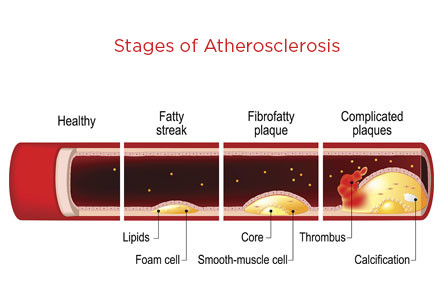Types of Cardiovascular Disease » What is ASCVD
There are several types of cardiovascular diseases. Read below to learn more about Atherosclerotic Cardiovascular Disease (ASCVD)

What is ASCVD? Atherosclerosis is a general term for many different disorders that result from a thickening and loss of elasticity in the arterial wall. It is a severe disorder and the leading cause of morbidity (sickness) and mortality (death) in most developed countries. Atherosclerosis is caused by high blood pressure, smoking, or high cholesterol. That damage leads to the formation of plaque.
The plaque may cause Atherosclerotic Cardiovascular Disease (ASCVD), which includes stroke, heart attack, and damage to peripheral arteries (in the legs), all which can lead to death, if left untreated.
It is important to live a healthy lifestyle, which includes a heart-healthy diet, exercise, avoiding tobacco, and keeping a healthy body weight. These are all important ways to stay healthy and reduce your risk of ASCVD, both prior to and with the use of cholesterol-lowering drug therapies.
Key points about ASCVD
- Always work with your primary care provider to identify effective treatments to lower your risk.
- It is important to have your cholesterol levels checked as high cholesterol is known to increase your risk for a heart attack or stroke.
- Knowing your risk of heart attack and stroke can help you and your primary care provider decide together when you should take medication to lower your risk.
- If you require medication, evidence shows that statins are the first choice to lower heart attack and stroke among certain higher-risk patients. If you aren’t able to take a statin, your primary care provider can recommend other cholesterol-lowering drugs.
